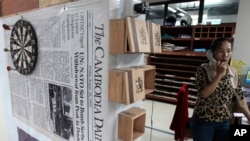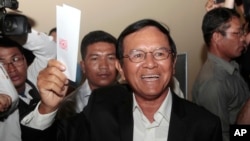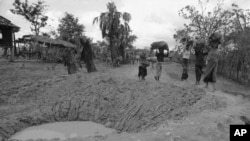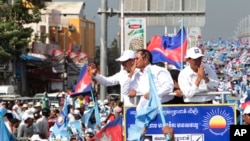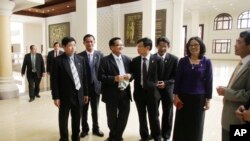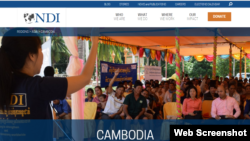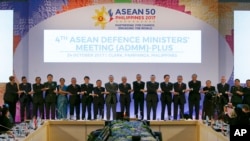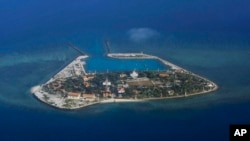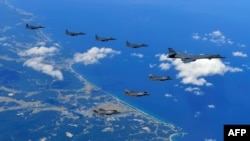In recent weeks, Cambodia has come in for strong criticism from the United States, the European Union and Japan after the government launched its harshest crackdown on the political opposition, independent media and civil society in many years.
The Cambodian People Party (CPP) government and the courts are moving to ban the Cambodian National Rescue Party (CNRP) following the arrest of its leader, Kem Sokha, on treason charges in late September. Many CNRP members have fled Cambodia. Western countries demand his release and warn that the 2018 general elections will not be recognized as democratic without opposition participation.
The downside occurs against the background of Cambodia’s ever-closer relationship with China. Its political support and investment for Prime Minister Hun Sen’s government has grown strong in recent years. In turn, Cambodia has backed China in international affairs, such as Beijing’s disputed claims in the South China Sea, while Phnom Penh seems to be abandoning the human-rights promoting donor countries on which it long relied.
In late September, Cambodian Minister of Foreign Affairs Prak Sokhon attended the 72nd UN General Assembly in New York, during which he fended off international criticism of his government. On the sidelines of the assembly, VOA reporter Sok Khemara interviewed the minister about the recent domestic and international developments.
Question: Greetings. It is an honor for VOA to have an exclusive interview with Cambodian Foreign Affairs Minister Prak Sokhon who has just released a statement to the 72nd UN General Assembly in New York, touching upon the Cambodian political situation and international issues. Greetings, Senior Minister.
Answer: Greetings.
Q: Thank you for giving VOA this interview. I have listened to your statement on human rights, international issues, democracy in Cambodia and other issues in the UN General Assembly. First, could you tell us about Cambodia’s stance on human rights and democracy that you raised at the UN, and in which you appeared to criticize some powerful countries?
A: Yes, thank you for the question. In my statement, on behalf of the Cambodian government, we focus on two important things. First, it relates to international issues; second, it relates to human rights and democracy in Cambodia as you have observed. In terms of international issues, we focus on our cooperation with the international community to achieve the UN’s Sustainable Development Goals by 2030 and to address climate change.
For sensitive international issues, we assert our firm stance on counter-terrorism, North Korea, and UN peacekeeping missions, which has been Cambodia’s major achievement so far.
Related to Cambodia’s internal affairs, it is required that we raise them. Let me adjust it a bit, (the statement) is not criticism. We just called on some major powers to evaluate human rights issues in Cambodia fairly because they have only a one-sided view of Cambodia without taking in the accounts from all fronts. The fact is that the Cambodian government abides by the law as enforced in the nation, particularly in terms of maintaining peace, stability and protecting the nation’s sovereignty against foreign intrusion into its internal affairs.
Q: You mention taking into account all fronts. What does this mean for human rights and democracy in Cambodia on the international stage?
A: Evaluation from all fronts means that one should not conduct a one-sided assessment, as you could see with the recent developments in Cambodia in the case of the arrest of Kem Sokha, the closure of NDI (a U.S.-funded National Democratic Institute), The Cambodia Daily and many radio stations. This has all to do with law enforcement.
Let me stress that, before we reached this point, Cambodia has embarked on a stable and peaceful path. We had commune elections that were properly organized and conducted in a fair and transparent manner. Many nations and observers have acknowledged this, except some countries who dare not say that it was free, fair and credible. That’s all. The word “free” is accurate and the word “fair” is to indicate all political parties have participated.
That is why we can say that the election result is credible because all political parties accepted the result. Hence, we paved the way toward the national elections in 2018. In the meantime, the government also needs to carry out the law properly. Previously, we drafted and the National Assembly had voted in the laws, but these were not implemented in full.
Some people and NGOs do not obey the law, and I have raised instances of people not obeying the law with the ambassadors. For example, in Cambodia, there were three big English-language newspapers: The Cambodia Daily, The Phnom Penh Post, and The Khmer Times. The Phnom Penh Post and Khmer Times pay tax. They obey the law. Why should The Cambodia Daily get away with (not paying tax)? That’s impossible. There are a lot of radio stations in Cambodia. Most of them comply with the agreement with the Ministry of Information. However, some radio stations do not, so we have to take legal action.
The case of Kem Sokha’s arrest is purely enforcement of the law. We can talk about that later. I just want to state that it’s a serious case that could affect peace, security, public order and stability as a whole because it is related to treason and collusion with a foreign government to topple a legally elected government. Any act that aims to topple a government that is formed through an election is a crime. Moreover, collusion with foreign governments to oust the government and drag the country into turmoil or civil war is a serious act of treason in which the perpetrator shall be incarcerated in accordance with the law. This is stated in Article 80 of the Constitution, Article 443 of the Criminal Code and Article 12 of the Law on Lawmakers.
Q: After Kem Sokha’s arrest there have been calls for justice from the U.S. and the E.U. There is also domestic criticism of the government, saying it is cracking down and preventing fair participation in the 2018 elections. What is your response to this?
A: Only the court can provide justice for Kem Sokha isn’t it? Kem Sokha committed an (alleged) crime and the accusation didn’t come out of the blue. Kem Sokha himself admitted his action in the video seen by everyone. Even though the video was shot in 2013, the leak occurred September 2, 2017. The leak came out around 6 p.m. that day and was published all over social media in the country.
The government pinpointed [the crime] and held talks on this matter. Thus, the arrest was not under the call of any single individual. There was a discussion among legal experts and it was found that there is misconduct. But there is a possibility of reactions from overseas claiming the arrest of an opposition leader is an act to curb the participation of the opposition party by the government.
To avoid any confusion, at 10 am on Sunday, September 3, I held a talk with the ambassadors to explain the cause of the Kem Sokha’s arrest. The ambassadors heard this explanation, despite their subsequent reaction thereafter. That’s the reason why I asked them to look at the issue from all angles, not just from one side, because we acted in accordance with the law.
I never forget the help those countries have provided for Cambodia. Thank you for the development aid, the cooperation, and the trade exchange that have contributed to Cambodia’s development so far. They taught us to adopt the law. For instance, after the (2017) commune election, the EU provided some advice to improve the next year’s elections. It is a good thing that they want the elections to be better. We responded to them. The important thing is that they gave us advice with the aim to achieve free, fair and credible elections. However, why do they support somebody with the ‘color-revolution’ mentality? This revolution aims to seek (political) change outside of the legal boundaries of the election.
These two approaches do not correspond at all — there are a formal stance and a shady one (among donor countries). That is why I appeal that we respect one another. I respect you, you respect me. That is not respecting on an individual basis, but respect for Cambodia’s sovereignty and independence, and no interference with the nation’s internal affairs.
There is nobody telling Kem Sokha to publicly admit what he did (alleged treason). Who incited him to say that? He said it by his own will…. he said that the U.S. hired him to do this and that. They told him to do things and he just did so. They told him to withdraw himself from politics (in the past), he did just that, then they told him to go back into politics, he obeyed. What does this mean? This means that he is an instrument of a major power that wants regime change through an undemocratic method.
Q: Has there been any talk with the U.S. concerning Kem Sokha’ arrest? Do you think the U.S. is behind Kem Sokha’s treason charges, will there be any lawsuit filed involving allegations against the US or any country?
A: Formally, we never make an accusation that the US is behind it. We base everything on the words coming out of Kem Sokha’s own mouth. Most importantly, the case is meant to protect Cambodia’s sovereignty and the nation’s hard-won peace, stability, and prosperity. As you know, we have achieved development a yearly average of 7.7 percent (GDP growth) in the last 20 years. What we should focus on is to explain the latest development to the U.S., with which there is somehow political tensions. It has been tense, with different proposed measures thrown back and forth.
Please allow me to shed some light on our relation with the U.S. The U.S.-Cambodia relation has been on a smooth path for the past five years. We have good cooperation in economics and trade. The (annual) trade exchange with the U.S. is up to $3.2 billion, of which the export to the U.S. is worth $2.8 billion - previously, the U.S. export was just $400 million.
Besides good trade relations and cooperation in the fight against terrorism and drug trafficking, we also improved (in the State Department’s annual Human Trafficking Report), moving from Tier Two Watch list to Tier Two, meaning that we’re no longer under observation. This is good when you consider Thailand is at lower tier than us.
In landmine eradication and UN peacekeeping effort, we received training from the U.S. to improve the capability of our peacekeeping forces. In terms of enhancing people relations, the Peace Corps has played an important role. For improving bilateral relations, I have talked with Deputy Assistant Secretary of State Daniel Russel, Deputy Assistant Secretary for Southeast Asia Patrick Murphy and Under Secretary of State for Political Affairs Thomas Shannon. I also met with Mrs. Susan Thornton, Acting Assistant Secretary of State For East Asian and Pacific Affairs. We know that the U.S. appointed a lot of people in an acting role. They are yet to appoint them formally. However, those people work with us formally. Thus, we held talks with them to search for ways to improve the matter and to explore the causes behind the issues.
So far, the differences are related to the three judicial cases that I have raised, all related to the U.S.: (the closing of) The Cambodia Daily because it is an American newspaper, (expelling) NDI, a U.S. institution for political parties, and the arrest of Kem Sokha, which is related to collusion with the U.S. However, unless the court passes the verdict, we cannot conclude anything. I would like to leave this matter to the court.
There is also another case (of political differences) regarding forcibly sending Cambodians back to their home country under the U.S. Repatriation Program, which is in fact deportation. In 2002, the US and Cambodia signed a MoU related to sending Cambodians, whose U.S. prison sentence has ended, back to Cambodia. We received more than 500 people between 2002 and 2017.
Until last year, we reconsidered and proposed to the U.S. that the MoU should be amended on humanitarian and sympathetic grounds. Why? First, because they already served their prison term; normally, in the U.S. if their conviction ends they are out of the prison and have full freedom again. But when they’re sent back to Cambodia after their term is finished, most of them are not familiar with or do not know the country. Second, it is about permanent family separation. This is the most serious issue because those people already have spouses and parents. Once they are sent back to Cambodia, they are detached from their family permanently.
Q: Going back to opposition leader Kem Sokha, can you say if he can participate in the 2018 elections?
A: Currently, Kem Sokha is already under allegation. He has seven lawyers working out his case for him. In the future, this has to go through an appeals court process. I cannot say in detail because this is the work of the court. Let the court decide on this.
If it is found that the allegation is false, he will be free. If the allegation is true, he will be held accountable. In the latter case, I think there is only one choice for the CNRP: Kem Sokha has to resign and the party needs to elect a new leader for the upcoming 2018 elections.
Q: When you came to join the UN Assembly, there was a protest by Cambodians abroad who called for the release of Kem Sokha. Nearby, there was also one protest against Myanmar (for rights violations against the Rohingya Muslims). What is your thought on such protests occurring in front the UN?
A: These are two different issues, we cannot make a comparison. The issue of Myanmar is related to ethnic conflict inside the country. In our case, it is simply a legal issue. I have already explained you the law.
Article 443 of the Criminal Code and Article 80 of the Constitution acknowledge the immunity of a lawmaker except in the case of criminal charges. And this is definitely a criminal charge. The lawmaker’s immunity, nor the time and place of arrest, matter in case of such a charge. Some people criticized that he was arrested at his house in the middle of the night. No, once there is an obvious criminal charge, the authority and the prosecutor went to Kem Sokha’s house and arrested him right away. This is in accordance with the law in Cambodia.
The law is there to protect, adopt and enforce the rule of law in Cambodia. Because this is a serious issue, we need to protect the sovereignty, territory, and independence of the nation against foreign intrusion. I want to state there can always be a case of treason in any country. In the U.S., they have a law on espionage and criminal law in which there are articles related to treason. The law clearly states its purpose: to protect against foreign intrusion in the U.S.
A major power like the U.S. still have laws against foreign intrusion. And small countries like us, if we do not have such law, what will happen to us? Thus, how can Kem Sokha participate in the upcoming elections?
Q: When there is a protest, the people show dissatisfaction. Does this mean that they will have difficulty traveling to Cambodia since they’re engaged in Kem Sokha’s case? Is there a guarantee that addresses the concern for their freedom of movement?
A: Holding the protest outside the country is their right. This is freedom of expression and we should respect that. They showed their opinion and were dissatisfied with our action, and we explained back to them. Like in my case, I decided to meet with you for an interview with VOA in order to explain the stance of the government concerning the action taken against Kem Sokha, as well as other issues arisen recently.
Q: Eight lawmakers from the two major political parties in the US who are dealing with affairs related to Cambodia issued a joint statement on the political situation. Some are calling for aid suspension to Cambodia because of Khem Sokha’s arrest. How is this issue being dealt with or explained?
A: In terms of this, we are preparing a response from the National Assembly because it is the work of Cambodian lawmakers to respond back to the American lawmakers. The Cambodian government, the Foreign Ministry spokesperson, the government spokesman, the National Assembly, the court, the Ministry of Justice and myself have also given a lot of responses so far.
So, like I mentioned in the first place, please review the issue from all angles. When they give out suggestions, I listen. However, when the Cambodian government does the same, they should listen as well.
Q: The 2018 elections will be highly important and civil society organizations will want to monitor its results. But if some are facing government allegations of tax evasion, as have been leveled against them, how can they observe and ensure elections are free and fair?
A: Freedom of expression and freedom to observe (elections) will be kept intact. But I appeal for this: do not commit any illegal activities. Why do they bother raising the tax issues as a burning concern for civil society? I have already raised the example of The Cambodia Daily. When the Phnom Penh Post and Khmer Times pay taxes, why doesn’t The Cambodia Daily? Some people spoke of the “imminent closure” of an independent newspaper.
First, concerning the use of phrase “imminent closure,” let me clarify that this was not the case. The Cambodia Daily was informed that tax was due to be paid that was compounded for the past 10 years. If taken into account their establishment in 1993, which was 23 or 24 years ago, the amount would have been even being bigger than this. However, the Law on Taxation is limited to collecting tax for just 10 years past. This is the lightest tax evaluation on their business income that amounted to $6.3 million for the past 10 years. Why don’t they pay?
Secondly, concerning the use of the word “independent,” can this word be used to justify the right to evade tax? Nobody can just declare themselves independent and not pay tax; independence does not mean free of taxation. Well, maybe they are independent, but they are doing business because The Cambodia Daily has advertisements all over the place. They also sell their newspapers. They are not a non-profit organization, they are a profit-seeking organization. That is why they should pay tax in accordance with their income.
Those who should pay tax shall do likewise, those who should register (as an NGO) shall do likewise. They should be hurry to register and reach a MoU (memorandum of understanding) with the Foreign Affairs Ministry. In the case of NDI (National Democratic Institute), before there was Law on Associations and NGOs, they never registered and never had a MoU with the Foreign Ministry as required. International NGOs should reach a MoU with the Foreign Affairs Ministry. They failed to register neither before, nor after the adoption of the law. They did wrong in this case.
Q: You might have seen through Facebook criticism of the registration for civil society organizations, unions or NDI. NDI explained they filed an application almost a year ago but never got the green light. Other civil society organizations said the government didn’t offer its acceptance. When they filed an application, it seemed any NGOs that are critical of the government are likely not to receive licenses. What is your response?
A: Not at all. There are thousands of NGOs that registered properly because in Cambodia there are more than 4.000 NGOs. Most of them registered properly. They didn’t have any problem with that. Those who complained are usually tainted themselves because in the law there is a point requiring verification of the source of funding, and those NGOs get secret funding from overseas. As a matter of fact, we know about this. Thus, those organizations would have complained of this and that. As long as they abide by the law, they will have full rights to do activities in Cambodia.
Q: At the next ASEAN summit, there will be many leaders, including U.S. President Donald Trump. Will there be a talk with the U.S. president about the rising tension between Cambodia and the US when Prime Minister Hun Sen takes part in the summit? Is there any plan to do so?
A: I have no knowledge of the plans so far. However, as usual, when the U.S. president takes part in the ASEAN summit, he has little time to meet bilaterally with the member countries.
First, it depends on the will of the U.S. President, this is an American prerogative. Secondly, we hope that gradually, based on the spirit of my meeting with Mrs. Susan Thornton yesterday, we will try to restore the relation to what it was before.
Q: Is there any assurance from Susan Thornton? Is there a time frame as to when a solution can be found? For instance, the case of sending Cambodian-Americans to Cambodia, how long will that take to resolve? Can the U.S. confirm that?
A: There are two issues concerning this. I also told Susan Thornton about this yesterday. It seems that I am in a difficult situation in terms of this. If I accept the conditions with the U.S., the Cambodian-American community will blame me because they have asked the Cambodian government no to take back Cambodian whose sentence has ended. If we do not, they (the U.S.) will impose sanctions. So this does not just affect an individual.
If we are insistent in this case, it will affect the visa application for university students and Cambodians who wish to visit their relatives in the U.S. as well as businessmen. Thus, I have to choose between the two. We seek to solve the issue in an easy manner as much as possible. Now we are waiting for the green light from the US as to when Cambodia can interview those 26 people (to be deported). Then, we will send our officials right away.
Therefore, it is a sign showing that Cambodia does not suspend or put an end to the repatriation program. This means that putting in place (U.S.) visa sanctions would have no grounds anymore, and the program on seeking the remnants of US soldiers missing in Cambodia can also resume. This will ease the relation between the two countries. We will resolve other issues gradually together. I can’t say how long it will take. However, in the near future, the U.S. will inform us when Cambodian officials can interview those 26 people.
Q: There are also statements of concern coming from the E.U. I want to know about the E.U.’s Everything But Arms policy (granting preferential market access to Cambodian exports). How is the situation now with the E.U. releasing statements on the recent developments in Cambodia?
A: During the meeting of UN Human Rights Council in Geneva recently, they listed 26 nations that have issues regarding human rights and democracy. Cambodia is not among those nations. The EU criticizing Cambodia is one thing, Cambodia’s relation with the EU is another, even though sometimes these two issues can interrelate due to the influence of the EU parliament and the European Commission in serious cases.
However, like I mentioned, Cambodia is not among the 26 nations that are considered to have human rights issues. We tried to explain to make the E.U. understand that what we did is according to the law, while press freedom, freedom of speech and political freedom are not affected. Those who do not violate the law still have full rights to carry out political activities. Only politicians with legal issues and engaged in court cases will not have such rights.
Q: What about claims that the government has shifted toward China more than any other Asian nation lately and there are concerns for the return of a China-backed regime like the Khmer Rouge. What is your response to that?
A: I don’t see any relation between the two questions because the Khmer Rouge regime already ended, and we are not talking about this further. There’s a possibility of civil war since some politicians embrace incitement and discrimination mentality, and want falsify border maps with the neighboring countries, causing confusion among the people. This could cause internal friction.
However, good relation with China is beneficial to Cambodia and her people because it is a mutual relation that serves the interests of the two nations. We have received a lot of aids and investment from China. China has invested in dams and provided cooperation aid. Six of our seven dam projects are under Chinese supervision with some form of aids, some loans, and there are some other joint ventures between Cambodian and Chinese firms.
Roads and bridges build through grants by China have helped improve the livelihoods of the people because it makes it easy to commute and transport goods across provinces. This has all served the interests of Cambodia. And this does not make Cambodia a satellite of China because we hold a firm stance on independent politics and neutrality. We are a neutral country. Thus, we hold on to this position. I don’t understand why Cambodia is accused of that (not being neutral), especially when those accusers are in fact dragging Cambodia towards the U.S. It makes no sense, in this case, to point the finger to Cambodia’s good relation with China.
Nonetheless, we do want good relation with all parties based on respect and equality. I understand that equality is limited in this sense due to the influence of major powers in the relation. This is true. But at least there should be respect for each nation’s sovereignty and independence.
Q: About the Cambodia-China relation and the establishment of the Code of Conduct in the South China Sea, which has caused friction among ASEAN members. What is Cambodia’s current position on this?
A: The South China Sea dispute took another hit with the verdict from the Permanent Court of Arbitration accepting the Philippines’ complaint filed against China.
But first, we are a neutral country, we do not take sides nor interfere in any country’s affairs. Secondly, we are not a claimant country of the sovereignty in the South China Sea region. Thirdly, we will try to maintain peace and interests of ASEAN as a whole. We see that the South China Sea dispute and the case related to Permanent Court of Arbitration concerns only the Philippines and China as we have learned in the summit four months ago.
President Rodrigo Duterte also stated that the issue was not between ASEAN and China, but between the Philippines and China. He said the issue was not a burning topic in the summit. Cambodia’s firm is to maintain peace and stability of the region’s status quo. Thus, we do not take sides.
So we need to make sure that the Declaration of the Code of Conduct is fully implemented and issue a declaration concerning the South China Sea. We need to agree to relieve the tension and prevent conflicts from arising in the region.
We should establish a hotline among the Foreign Ministers of ASEAN member countries and China on top of the Code of Conduct, in case we come across unexpected issues. We also need to exercise restraint in accordance with the Code of Conduct so as to avoid confusion. Eight months ago, we also agreed to implement the Code of Conduct for South China Sea. Cambodia’s stance is supporting a peaceful resolution of the South China Sea dispute. We say yes to solidarity in ASEAN and no to taking side with any country that is involved in the dispute. Our stance is simple. That is seeking peaceful resolution in compliance with the law.
Q: In the reports and comments of ASEAN officials, there is no specific reference as to which entity or court should deal with the South China Sea dispute. Can Cambodia shed some light on this?
A: This depends on the parties involved in the issue. As I have mentioned, this dispute is not between China and ASEAN. It is a dispute between one country and another, between China and the Philippines or Brunei or Vietnam. But it’s not a dispute between China and ASEAN. It is not necessary for ASEAN to include those issues in its formal agenda because the issue has nothing to do with ASEAN.
Q: On the matter of North Korea, the government released statements concerning its missile tests. What can you say about this issue?
A: We are concerned about the situation on the Korean Peninsula. Let me clarify that there is a North Korea issue and Korean Peninsula issue because if we talk about an issue concerning the Korean Peninsula, it involves with other parties in the region. North Korea is one party, but not a sole one.
In terms of Korean Peninsula issue, the situation has worsened recently because there are acts of aggression from the parties involved in the conflict. As you have learned, Cambodia has a relation with North Korea because Prince Norodom Sihanouk had a special relation with the North Korean President Kim Il Sung.
Since then we have maintained that relation. However, because North Korea has been behaving out of line, as a UN member, Cambodia needs to remind North Korea that it needs to abide by the resolutions set by the UN.
There are now tougher resolutions slapped on North Korea with trade suspension and a clamp down on businesses that provide funding for North Korea missile program. Despite good relations with North Korea, Cambodia released two statements separately in 2016 and two more this year related to North Korea’s missile launches and nuclear tests.
So we reaffirmed our stance with North Korea. If they want to be our friend, they should respect the decisions of the UN Security Council, the decision of the UN member countries and the international community, and they should abandon their nuclear program.
We think that what happened is due to back-and-forth provocation. The U.S. and South Korea have also increased their military drills. This has caused concerns for North Korea which then pushes the nuclear program. In such a cycle the situation is bound to worsen.
When Cambodia releases a statement, we want North Korea to abide by UN Security Council resolutions and do its duty. Second, we call for all parties to exercise restraint and avoid any action that causes tension to rise because if war broke out, it would not only affect the two countries in conflict but the region and the world as a whole. We also call for the consideration of a proposal by China and Russia termed ‘double free,’ which proposes a suspension of North Korea’s nuclear program and a suspension or reduction of military drills of the South Korea and the U.S.
In the meantime, we also support the Berlin Initiative as raised by South Korean President Moon Jae-In during his trip to Berlin, which aims to pave the way for peace negotiations between the two Koreas.
Q: Could there be a suspension or reduction of North Korean trade with Cambodia and untying the relationship between the two countries?
A: Honestly speaking, we have declined proposals from North Korea for the exchange visit by senior government officials. Cambodia has declined visit invites for the Foreign Minister, the National Assembly President, the Foreign Vice-Minister, the director and so on to show that they have to abide by the UN resolution before we get a chance to restore the relation.
If we accept their proposal, it means that Cambodia violates the UN resolution. Concerning business activities, we have also done some research related to North Korean economic activities in Cambodia in order to take appropriate action.
Q: In terms of Cambodian migrant workers going to Thailand and South Korea, is there any new agreement or measure to better provide passports or expedite their visa applications?
A: In South Korea we do not have any problems (with unregistered immigration) because South Korea is far away and there are no other channels to go there as in the case of Thailand. Thus, they need to have proper documents which means they need to have passport and visa. That way, they will have the rights to work right away once they are in South Korea.
However, there are few illegal cases that involve some workers having an informal contract with another Korean company when their formal contract ends with the current company. We advised migrant workers to abide by the law in the foreign country and ensure their safety and legality as not to have any trouble with authority.
But there are cases of migrant workers listening to middlemen when they are seeking work in Thailand. So the middlemen take advantage of the migrant workers. In some cases, the migrant workers get scammed. Apart from a few cases of scams, there is still another burning concern we are trying to address. That is the legal documentation of the workers. In this case, we have launched a campaign to provide more than 200,000 passports to the migrant workers.
It is somehow difficult to inform and distribute the passports when migrant workers return (from Thailand) to their provinces. That is why we need to register their names (at the Cambodian Embassy in Thailand) to know where they work so that we can bring the passports to them. This way we can also identity Cambodian migrant workers who are working illegally in Thailand.
Travel documents, particular passports, are our focus for the migrant workers. We have deployed many immigration officers, even at the Cambodian Embassy in Thailand. The parking space was renovated and air conditioning was installed to serve migrant workers who came to fill up work application in Thailand. We are doing our best to make sure they are working legally so as not to be exploited. That is why we are trying to protect and facilitate for them. They can come to the embassy at any time whenever they have a problem.
Q: How far is the cooperation with Thailand on this? Because it seems some issues in Thailand are not communicated with Cambodia or migrant workers. Then we see the rapid expulsion of the workers sometimes.
A: We held a lot of discussions from the officer level up to ministerial level. I myself have also held a lot of talks with Thai Foreign Affairs Minister Don Pramudwinai to raise the issues of our migrant workers. But normally the Foreign Affairs Ministry is not the one that deals with migrant workers completely. We only help facilitate the paperwork. More importantly, it’s the job of the Ministries of Labor and Thai immigration officials.
There are also proposals for cooperation and facilitation, and I have appealed to Thai Prime Minister Prayut Chan-o-Cha. Prime Minister Hun Sen has also raised the issue with the Thai Prime Minister when Prayut paid a visit to Cambodia on September 7. Lately, there have been discussions to facilitate the migrant workers as much as possible to prevent their exploitation in Thailand.
We have also discussed the use of firearms against illegal loggers because in Cambodia some people are cheated into cutting illegal timber in Thai territory and bringing the logs back into Cambodia (and getting shot by authorities). So we call for more cooperation in this field to avoid the loss of life of our people, despite their wrongdoing.
Q: As we’re getting to the end of the interview, I want to hear your position on terrorism and climate change. What role has Cambodia played in this context?
A: For terrorism, we condemn any act of terrorism because we cannot accept the killing of any innocent life. We also acknowledge that no country is free from terrorist threats, though Cambodia has yet to see a terrorist act taking place.
We are fully prepared for any act of terrorism. We need to address terrorism. That is to address the cause of terrorism, the cause related to social inequity, discrimination and religious persecution and hatred. But all religions can co-exist in Cambodia.
This is the policy of Prime Minister Hun Sen who supports different religions: Islam, Christianity, and Buddhism alike. Another issue we need to address is the financing of terrorism since any terrorist act needs funding. When we can cut the funding we can prevent terrorism.
Another point to take into account is the event that took place in Marawi in the Philippines, which showed that terrorists were seeking to establish a base in Southeast Asia. Thus, all the ASEAN member countries are joining hands to prevent any terrorist acts from happening as in the case of Syria and Iraq.
In terms of climate change, we already signed the Paris Climate Accord. The parliament also approved the treaty early this year. We are wholeheartedly willing to take part in addressing climate change as Cambodia also bears its effects. In addition, we have taken action to contribute to the fight against climate change with the international community.
Q: Lastly, do you have any words for fellow Cambodians from here in New York City?
A: Pchum Ben has just ended recently. I don’t have a lot of words, but I would like Cambodians living in the U.S., as well as in other nations, to carefully observe the situation in Cambodia by seeing thing from all angles before making any allegation.
Let me take this chance to wish all Cambodian people wellness and strength, success in all of their work and happiness in their family.
Q: Thank you, Mr. Senior Minister for talking to VOA after your statement at the UN National Assembly. Thank you for spending your time with us. Good-bye.
A: Good bye.







